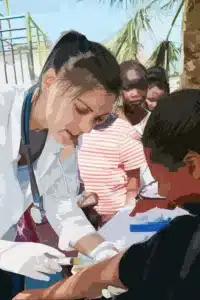In this article, we’ll delve into the potential link between Vyvanse and aggressive behavior in children. You’ll gain insights into the mechanism of Vyvanse, contributing factors to aggression, its role in ADHD treatment, and strategies to manage aggression in children. Get ready to explore this crucial topic!
The Vyvanse-Aggression Connection
Vyvanse, a commonly prescribed medication for Attention Deficit Hyperactivity Disorder (ADHD), has sparked debates regarding its impact on children’s behavior. Let’s dissect this connection:
The Mechanism of Vyvanse
Vyvanse operates by altering neurotransmitter activity in the brain. By primarily affecting dopamine and norepinephrine, it aims to enhance focus and impulse control in individuals with ADHD. However, this alteration can sometimes manifest as aggression in certain children.
Key Points:
- Vyvanse’s primary mechanism is dopamine modulation.
- Dopamine’s role in mood regulation.
- Increased dopamine levels and its potential link to aggression.
Contributing Factors to Aggression
Aggressive behavior in children on Vyvanse can stem from various factors, including:
Psychological Factors:
- The influence of ADHD on emotional regulation.
- Psychological assessments to identify risk factors.
Environmental Factors:
- Family dynamics and upbringing.
- Social influences and peer interactions.
Evaluating Vyvanse as a Treatment Option
Vyvanse offers undeniable benefits in treating ADHD, such as improved focus and academic performance. However, understanding the potential risks is crucial.
Benefits of Vyvanse
Vyvanse’s benefits extend beyond ADHD symptom management. It often leads to:
Academic Performance Enhancement:
- Improved attention span during learning.
- Positive effects on grades and academic achievements.
Assessing Side Effects and Risks
Although Vyvanse is generally well-tolerated, it can exhibit side effects, including:
Common Side Effects:
- Insomnia and reduced appetite.
- Mood swings or irritability.
Rare but Severe Side Effects:
- Cardiovascular issues and potential risks.
- Psychiatric side effects like aggression.
Managing Aggression in Children on Vyvanse
When aggression surfaces in children taking Vyvanse, effective management is essential to ensure their well-being.
Behavioral Interventions
Implementing behavioral strategies is a key component of managing aggression:
Therapeutic Strategies:
- Cognitive-behavioral therapy (CBT) techniques.
- Anger management and emotional regulation tools.
Parenting Techniques:
- Consistent discipline and boundaries.
- Open communication with children.
Consulting with Healthcare Professionals
For parents facing aggression issues, consulting healthcare experts is crucial:
Role of Pediatricians and Psychiatrists:
- Medication adjustments when necessary.
- Exploration of alternative treatments.
The Role of Medication Dosage
Understanding how Vyvanse dosage affects aggression is essential. Dosage plays a critical role in medication effectiveness and potential side effects.
Optimal Dosage for ADHD
Finding the right dosage for children with ADHD is a meticulous process:
Gradual Titration:
- Starting with a low dose and gradually increasing.
- Monitoring behavioral changes during titration.
Individualized Treatment:
- The importance of tailoring dosage to each child’s needs.
- Consulting with a healthcare provider for adjustments.
Duration of Vyvanse Treatment
The duration of Vyvanse treatment can influence the likelihood of aggression. Let’s delve into this aspect:
Short-Term vs. Long-Term Effects
Assessing how aggression may vary over time on Vyvanse:
Short-Term Effects:
- Initial adjustment period and potential side effects.
- Observing behavior changes in the first few weeks.
Long-Term Considerations:
- Stability of aggression levels with sustained use.
- Regular monitoring for any evolving behavioral patterns.
Alternatives to Vyvanse
Exploring alternative ADHD treatments is crucial for parents concerned about aggression:
Non-Stimulant Medications
Non-stimulant options and their potential for managing ADHD:
Types of Non-Stimulants:
- Atomoxetine (Strattera) and its mechanism of action.
- Guaranteed absence of stimulant-related side effects.
Behavioral Therapies
Behavioral approaches to ADHD treatment and their effectiveness:
Cognitive-behavioral therapy (CBT) and its role in behavior modification.
- Skills acquisition for emotional regulation.
- Combining therapy with medication when necessary.
Monitoring and Communication
Regular monitoring and communication are essential aspects of managing Vyvanse-related aggression:
Parent-Teacher Collaboration
The importance of maintaining a strong line of communication:
Sharing behavioral observations and concerns with teachers.
- Establishing a supportive learning environment.
- Creating consistency in behavior management strategies.
Medication Check-Ins
Regular check-ins with healthcare providers:
Discussing any changes in behavior or side effects.
- Reviewing the effectiveness of the current treatment plan.
- Ensuring proper dosage and medication adjustments if needed.
Parental Involvement in Behavior Modification
Active parental involvement is crucial in addressing aggression in children on Vyvanse:
Behavior Modification Strategies
Parents can collaborate with professionals to implement effective strategies:
Positive Reinforcement:
- Using rewards to encourage desirable behaviors.
- Creating a structured reward system at home and school.
Consistent Consequences:
- Implementing fair and consistent consequences for aggression.
- Teaching children about accountability for their actions.
Peer Relationships and Social Skills
Aggressive behavior can impact a child’s social interactions:
Impact on Peer Relationships
Understanding how aggression affects peer dynamics:
Isolation and Peer Rejection:
- Exploring the link between aggression and isolation.
- Addressing the consequences of peer rejection.
Social Skills Training:
- Enrolling children in social skills development programs.
- Building healthy relationships and conflict resolution skills.
Understanding Underlying Emotional Factors
Emotional factors can contribute to aggression in children:
Anxiety and Frustration
The role of anxiety and frustration in aggressive outbursts:
Identifying Triggers:
- Recognizing situations that trigger anxiety or frustration.
- Developing coping strategies to manage emotions.
Therapeutic Interventions:
- Therapies like play therapy for younger children.
- Counseling for older children to address emotional concerns.
Vyvanse and Coexisting Conditions
Children with coexisting conditions require specialized attention:
Comorbidities and Aggression
Exploring the impact of comorbid conditions on aggression:
ADHD and Oppositional Defiant Disorder (ODD):
- Addressing the challenges of managing both conditions.
- Customized treatment plans for dual diagnoses.
Tourette Syndrome and Tic Disorders:
- Recognizing the potential exacerbation of tics by Vyvanse.
- Collaborative care with neurologists and specialists.
Vyvanse and Sleep Patterns
The relationship between Vyvanse and sleep patterns is a critical consideration:
Sleep Disruptions and Aggression
Understanding how changes in sleep can influence aggression:
Insomnia and Sleep Disturbances:
- Exploring the impact of Vyvanse on sleep quality.
- Addressing the potential role of sleep deprivation in aggression.
Sleep Hygiene Strategies:
- Establishing healthy sleep routines for children on Vyvanse.
- Consulting with healthcare providers for sleep-related concerns.
Vyvanse and Individual Variations
Each child’s response to Vyvanse can be unique:
Genetic Factors and Sensitivity
Considering genetic influences on Vyvanse response and aggression:
Genetic Testing:
- Advancements in genetic testing for medication sensitivity.
- Tailoring treatment based on genetic profiles.
Personalized Treatment Plans
The importance of individualized approaches to Vyvanse treatment:
Consulting with specialists for personalized care:
- Psychiatrists and genetic counselors.
- Creating a comprehensive treatment plan based on individual needs.
Educational Advocacy for Children on Vyvanse
Ensuring that children on Vyvanse receive the support they need in an educational setting:
504 Plans and IEPs
Navigating the process of creating Individualized Education Plans (IEPs) or 504 Plans:
Educational accommodations for ADHD-related challenges.
- Advocating for necessary adjustments in the classroom.
- Ensuring teachers are informed about Vyvanse treatment.
Teacher-Parent Collaboration
Fostering collaboration between parents and teachers for the child’s benefit:
Open communication channels:
- Regular meetings to discuss progress and challenges.
- Implementing strategies that align with treatment goals.
Vyvanse Discontinuation and Aggression
Discontinuing Vyvanse can have its own set of challenges:
Withdrawal Symptoms and Aggression
Understanding the potential for withdrawal-related aggression:
Gradual Tapering:
- The importance of slowly reducing Vyvanse dosage.
- Minimizing withdrawal symptoms and behavioral changes.
Consultation with Healthcare Providers:
- Seeking professional guidance when discontinuing Vyvanse.
- Exploring alternative treatment options if necessary.
Long-Term Behavioral Strategies
Long-term strategies are crucial for managing aggression over time:
Consistency and Patience
The role of consistency and patience in behavior management:
Setting clear and consistent expectations:
- Establishing routines that promote positive behavior.
- Reinforcing patience in managing challenges.
Tracking Progress:
- Monitoring behavioral changes and improvements.
- Recognizing the child’s efforts and successes.
Parental Support Networks
Parents of children on Vyvanse benefit from support networks:
Support Groups and Resources
Exploring available support options for parents:
Joining local or online support groups:
- Sharing experiences and coping strategies.
- Accessing valuable resources and information.
Professional Guidance:
- Consulting with therapists or counselors for parental support.
- Learning effective communication and behavior management techniques.
Conclusion
In conclusion, understanding the potential link between Vyvanse and aggression in children is vital for parents and healthcare providers. While Vyvanse can be an effective treatment for ADHD, it may lead to aggression in some cases. By considering factors like dosage, coexisting conditions, and behavioral strategies, parents and professionals can work together to manage and mitigate aggression, ensuring the well-being of the child.
Frequently Asked Questions (FAQs)
1. Can Vyvanse cause aggression in children?
Answer: Vyvanse, like other medications used to treat ADHD, may lead to increased irritability or aggression in some children. It’s essential to monitor your child’s behavior and consult with a healthcare professional if you have concerns.
2. Is aggression a common side effect of Vyvanse?
Answer: Aggression is not a common side effect of Vyvanse, but it can occur in a minority of cases. Most children with ADHD experience improvements in behavior and focus with Vyvanse.
3. How can I differentiate between typical childhood aggression and aggression caused by Vyvanse?
Answer: Distinguishing between the two can be challenging. Look for patterns and changes in behavior. If you suspect Vyvanse is a factor, consult your child’s healthcare provider for guidance.
4. Should I consider discontinuing Vyvanse if my child displays aggression?
Answer: Discontinuing Vyvanse should only be under the guidance of a healthcare professional. Abruptly stopping the medication can have adverse effects. Discuss any concerns with your child’s doctor.
5. Are there alternative medications to Vyvanse for ADHD that may reduce aggression?
Answer: Yes, there are alternative medications such as methylphenidate-based drugs or non-stimulant options like atomoxetine (Strattera). These may have different effects on behavior and can be considered if aggression is a concern.
6. Can behavioral therapy help reduce aggression in children taking Vyvanse?
Answer: Yes, behavioral therapy can be an effective complement to medication. Therapeutic interventions can teach children coping strategies, emotional regulation, and conflict resolution skills to reduce aggression.
7. Is it safe to adjust Vyvanse dosage to address aggression?
Answer: Any adjustments to Vyvanse dosage should be made in consultation with a healthcare provider. Modifying the dose without professional guidance can lead to adverse effects or reduced efficacy.
8. How can I support my child’s social interactions if they are on Vyvanse?
Answer: Encourage social skills development through activities and social groups. Open communication with teachers and peers can help create a supportive environment for your child.
9. What role does sleep play in Vyvanse-related aggression?
Answer: Sleep disruptions caused by Vyvanse can contribute to irritability and aggression. Establishing healthy sleep routines and discussing sleep-related concerns with a healthcare provider is important.
10. Are there support networks for parents dealing with Vyvanse-related aggression in their children?
Answer: Yes, there are support groups and online resources available to parents. These networks offer valuable insights, coping strategies, and a sense of community for parents faci











